formerly eScholarship Editions


|
|
|
|
Your search for
'History' in subject
found 514 book(s). | Modify Search | Displaying 101 - 120 of 514 book(s) | |
| 101. |  | Title: The culture of sectarianism: community, history, and violence in nineteenth-century Ottoman Lebanon Author: Makdisi, Ussama Samir 1968- Published: University of California Press, 2000 Subjects: History | Middle Eastern History | Middle Eastern Studies | Postcolonial Studies | Islam | Cultural Anthropology Publisher's Description: Focusing on Ottoman Lebanon, Ussama Makdisi shows how sectarianism was a manifestation of modernity that transcended the physical boundaries of a particular country. His study challenges those who have viewed sectarian violence as an Islamic response to westernization or simply as a product of social and economic inequities among religious groups. The religious violence of the nineteenth century, which culminated in sectarian mobilizations and massacres in 1860, was a complex, multilayered, subaltern expression of modernization, he says, not a primordial reaction to it. Makdisi argues that sectarianism represented a deliberate mobilization of religious identities for political and social purposes. The Ottoman reform movement launched in 1839 and the growing European presence in the Middle East contributed to the disintegration of the traditional Lebanese social order based on a hierarchy that bridged religious differences. Makdisi highlights how European colonialism and Orientalism, with their emphasis on Christian salvation and Islamic despotism, and Ottoman and local nationalisms each created and used narratives of sectarianism as foils to their own visions of modernity and to their own projects of colonial, imperial, and national development. Makdisi's book is important to our understanding of Lebanese society today, but it also makes a significant contribution to the discussion of the importance of religious discourse in the formation and dissolution of social and national identities in the modern world. [brief] Similar Items |
| 102. | 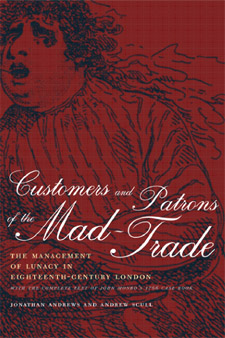 | Title: Customers and patrons of the mad-trade: the management of lunacy in eighteenth-century London: with the complete text of John Monro's 1766 case book Author: Andrews, Jonathan 1961- Published: University of California Press, 2003 Subjects: History | History of Science | Psychology | Social Problems | Psychiatry Publisher's Description: This book is a lively commentary on the eighteenth-century mad-business, its practitioners, its patients (or "customers"), and its patrons, viewed through the unique lens of the private case book kept by the most famous mad-doctor in Augustan England, Dr. John Monro (1715-1791). Monro's case book, comprising the doctor's jottings on patients he saw in the course of his private practice--patients drawn from a great variety of social strata--offers an extraordinary window into the subterranean world of the mad-trade in eighteenth-century London. The volume concludes with a complete edition of the case book itself, transcribed in full with editorial annotations by the authors. In the fragmented stories Monro's case book provides, Andrews and Scull find a poignant underworld of human psychological distress, some of it strange and some quite familiar. They place these "cases" in a real world where John Monro and othersuccessful doctors were practicing, not to say inventing, the diagnosis and treatment of madness. [brief] Similar Items |
| 103. | 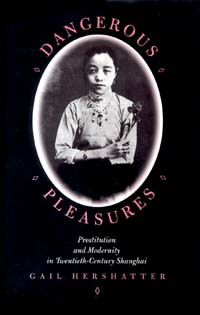 | Title: Dangerous pleasures: prostitution and modernity in twentieth-century Shanghai Author: Hershatter, Gail Published: University of California Press, 1997 Subjects: History | Women's Studies | China Publisher's Description: This pioneering work examines prostitution in Shanghai from the late nineteenth century to the present. Drawn mostly from the daughters and wives of the working poor and declassè elites, prostitutes in Shanghai were near the bottom of class and gender hierarchies. Yet they were central figures in Shanghai urban life, entering the historical record whenever others wanted to appreciate, castigate, count, regulate, cure, pathologize, warn about, rescue, eliminate, or deploy them as a symbol in a larger social panorama.Over the past century, prostitution has been understood in many ways: as a source of urbanized pleasures, a profession full of unscrupulous and greedy schemers, a changing site of work for women, a source of moral danger and physical disease, a marker of national decay, and a sign of modernity. For the Communist leadership of the 1950s, the elimination of prostitution symbolized China's emergence as a strong, healthy, and modern nation. In the past decade, as prostitution once again has become a recognized feature of Chinese society, it has been incorporated into a larger public discussion about what kind of modernity China should seek and what kind of sex and gender arrangements should characterize that modernity.Prostitutes, like every other non-elite group, did not record their own lives. How can sources generated by intense public argument about the "larger" meanings of prostitution be read for clues to those lives? Hershatter makes use of a broad range of materials: guidebooks to the pleasure quarters, collections of anecdotes about high-class courtesans, tabloid gossip columns, municipal regulations prohibiting street soliciting, police interrogations of streetwalkers and those accused of trafficking in women, newspaper reports on court cases involving both courtesans and streetwalkers, polemics by Chinese and foreign reformers, learned articles by Chinese scholars commenting on the world history of prostitution and analyzing its local causes, surveys by doctors and social workers on sexually transmitted disease in various Shanghai populations, relief agency records, fictionalized accounts of the scams and sufferings of prostitutes, memoirs by former courtesan house patrons, and interviews with former officials and reformers.Although a courtesan may never set pen to paper, we can infer a great deal about her strategizing and working of the system through the vast cautionary literature that tells her customers how not to be defrauded by her. Newspaper accounts of the arrests and brief court testimonies of Shanghai streetwalkers let us glimpse the way that prostitutes positioned themselves to get the most they could from the legal system. Without recourse to direct speech, Hershatter argues, these women have nevertheless left an audible trace. Central to this study is the investigation of how things are known and later remembered, and how, later still, they are simultaneously apprehended and reinvented by the historian. [brief] Similar Items |
| 104. | 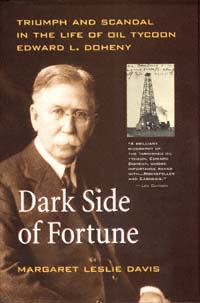 | Title: Dark side of fortune: triumph and scandal in the life of oil tycoon Edward L. Doheny Author: Davis, Margaret L Published: University of California Press, 1998 Subjects: History | California and the West | American Studies | Cultural Anthropology | Autobiographies and Biographies Publisher's Description: Dark Side of Fortune contains all the elements of a Hollywood thriller. Filling in one of the most important gaps in the history of the American West, Margaret Leslie Davis's riveting biography follows Edward L. Doheny's fascinating story from his days as an itinerant prospector in the dangerous jungles of Mexico, where he built the $100-million oil empire that ushered in the new era of petroleum. But it was a tale that ended in tragedy, when - at the peak of his economic power - Doheny was embroiled in the notorious Teapot Dome scandal and charged with bribing the U.S. Secretary of the Interior.Few captains of industry have matched Doheny's drive to succeed and his far-reaching ambition. Drawn to the West in search of fortune, he failed at prospecting before finding oil in a smelly, tar-befouled lot in Los Angeles in 1892. Certain that the substance had commercial value, he envisioned steamships and locomotives no longer powered by coal, but by oil. After developing massive oil wells in Mexico, Doheny built an international oil empire that made him one of the wealthiest men in the world. But in 1924 the scandal of Teapot Dome engulfed him. As accusations mounted, he hired America's top legal talent for his defense. During the ten-year-long litigation, Doheny's only son was mysteriously murdered by a family confidant. The government's case against Doheny ended in an astounding jury decision: The cabinet official accused of taking a bribe from Doheny was found guilty and sent to prison, yet Doheny was fully acquitted. Despite the verdict, the scandal had overshadowed the achievements of a lifetime, and he died in disgrace in 1935.Margaret Leslie Davis recreates the legal drama and adds details of behind-the-scenes strategy gleaned from the personal diaries and archives of Doheny's famed defense attorneys. Previously hidden personal correspondence adds to this first complete portrait of the man and answers questions about Doheny that have eluded historians for almost seventy-five years. [brief] Similar Items |
| 105. | 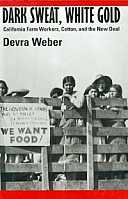 | Title: Dark sweat, white gold: California farm workers, cotton, and the New Deal Author: Weber, Devra 1946- Published: University of California Press, 1994 Subjects: History | Californian and Western History | Latino Studies | Labor Studies | California and the West | African History Publisher's Description: In her incisive analysis of the shaping of California's agricultural work force, Devra Weber shows how the cultural background of Mexican and, later, Anglo-American workers, combined with the structure of capitalist cotton production and New Deal politics, forging a new form of labor relations. She pays particular attention to Mexican field workers and their organized struggles, including the famous strikes of 1933.Weber's perceptive examination of the relationships between economic structure, human agency, and the state, as well as her discussions of the crucial role of women in both Mexican and Anglo working-class life, make her book a valuable contribution to labor, agriculture, Chicano, Mexican, and California history. [brief] Similar Items |
| 106. | 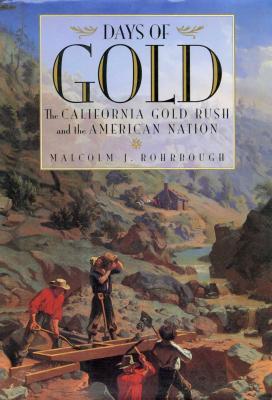 | Title: Days of gold: the California Gold Rush and the American nation Author: Rohrbough, Malcolm J Published: University of California Press, 1997 Subjects: History | California and the West | Californian and Western History | United States History | American Studies | Gender Studies Publisher's Description: On the morning of January 24, 1848, James W. Marshall discovered gold in California. The news spread across the continent, launching hundreds of ships and hitching a thousand prairie schooners filled with adventurers in search of heretofore unimagined wealth. Those who joined the procession - soon called 49ers - included the wealthy and the poor from every state and territory, including slaves brought by their owners. In numbers, they represented the greatest mass migration in the history of the Republic.In this first comprehensive history of the Gold Rush, Malcolm J. Rohrbough demonstrates that in its far-reaching repercussions, it was the most significant event in the first half of the nineteenth century. No other series of events between the Louisiana Purchase and the Civil War produced such a vast movement of people; called into question basic values of marriage, family, work, wealth, and leisure; led to so many varied consequences; and left such vivid memories among its participants.Through extensive research in diaries, letters, and other archival sources, Rohrbough uncovers the personal dilemmas and confusion that the Gold Rush brought. His engaging narrative depicts the complexity of human motivation behind the event and reveals the effects of the Gold Rush as it spread outward in ever-widening circles to touch the lives of families and communities everywhere in the United States. For those who joined the 49ers, the decision to go raised questions about marital obligations and family responsibilities. For those men - and women, whose experiences of being left behind have been largely ignored until now - who remained on the farm or in the shop, the absences of tens of thousands of men over a period of years had a profound impact, reshaping a thousand communities across the breadth of the American nation. [brief] Similar Items |
| 107. | 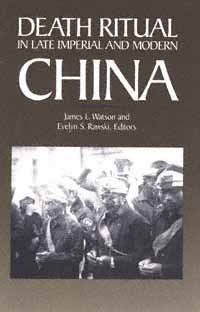 | Title: Death ritual in late imperial and modern China Author: Watson, James L Published: University of California Press, 1988 Subjects: History | China | Anthropology | Asian History Publisher's Description: During the late imperial era (1500-1911), China, though divided by ethnic, linguistic, and regional differences at least as great as those prevailing in Europe, enjoyed a remarkable solidarity. What held Chinese society together for so many centuries? Some scholars have pointed to the institutional control over the written word as instrumental in promoting cultural homogenization; others, the manipulation of the performing arts. This volume, comprised of essays by both anthropologists and historians, furthers this important discussion by examining the role of death rituals in the unification of Chinese culture. [brief] Similar Items |
| 108. | 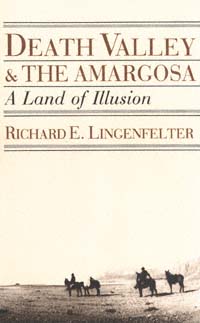 | Title: Death Valley & the Amargosa: a land of illusion Author: Lingenfelter, Richard E Published: University of California Press, 1988 Subjects: History | California and the West | United States History Similar Items |
| 109. |  | Title: Decades of crisis: Central and Eastern Europe before World War II Author: Berend, T. Iván (Tibor Iván) 1930- Published: University of California Press, 1998 Subjects: History | European History | European Studies | Russian and Eastern European Studies | Economics and Business Publisher's Description: Only by understanding Central and Eastern Europe's turbulent history during the first half of the twentieth century can we hope to make sense of the conflicts and crises that have followed World War II and, after that, the collapse of Soviet-controlled state socialism. Ivan Berend looks closely at the fateful decades preceding World War II and at twelve countries whose absence from the roster of major players was enough in itself, he says, to precipitate much of the turmoil.As waves of modernization swept over Europe, the less developed countries on the periphery tried with little or no success to imitate Western capitalism and liberalism. Instead they remained, as Berend shows, rural, agrarian societies notable for the tenacious survival of feudal and aristocratic institutions. In that context of frustration and disappointment, rebellion was inevitable. Berend leads the reader skillfully through the maze of social, cultural, economic, and political changes in Hungary, Czechoslovakia, Yugoslavia, Poland, Romania, Bulgaria, Albania, Austria, Latvia, Lithuania, Estonia, and the Soviet Union, showing how every path ended in dictatorship and despotism by the start of World War II. [brief] Similar Items |
| 110. | 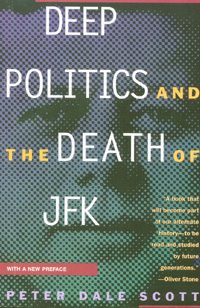 | Title: Deep politics and the death of JFK Author: Scott, Peter Dale Published: University of California Press, 1993 Subjects: History | Politics | Popular Culture | United States History | American Studies | Sociology Publisher's Description: Peter Dale Scott's meticulously documented investigation uncovers the secrets surrounding John F. Kennedy's assassination. Offering a wholly new perspective - that JFK's death was not just an isolated case, but rather a symptom of hidden processes - Scott examines the deep politics of early 1960s American international and domestic policies.Scott offers a disturbing analysis of the events surrounding Kennedy's death, and of the "structural defects" within the American government that allowed such a crime to occur and to go unpunished. In nuanced readings of both previously examined and newly available materials, he finds ample reason to doubt the prevailing interpretations of the assassination. He questions the lone assassin theory and the investigations undertaken by the House Committee on Assassinations, and unearths new connections between Oswald, Ruby, and corporate and law enforcement forces.Revisiting the controversy popularized in Oliver Stone's movie JFK, Scott probes the link between Kennedy's assassination and the escalation of the U.S. commitment in Vietnam that followed two days later. He contends that Kennedy's plans to withdraw troops from Vietnam - offensive to a powerful anti-Kennedy military and political coalition - were secretly annulled when Johnson came to power. The split between JFK and his Joint Chiefs of Staff, and the collaboration between Army Intelligence and the Dallas Police in 1963, are two of the several missing pieces Scott adds to the puzzle of who killed Kennedy and why.Scott presses for a new investigation of the Kennedy assassination, not as an external conspiracy but as a power shift within the subterranean world of American politics. Deep Politics and the Death of JFK shatters our notions of one of the central events of the twentieth century. [brief] Similar Items |
| 111. | 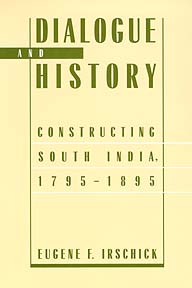 | Title: Dialogue and history: constructing South India, 1795-1895 Author: Irschick, Eugene F Published: University of California Press, 1994 Subjects: History | Asian History | South Asia | Cultural Anthropology Publisher's Description: Eugene Irschick deftly questions the conventional wisdom that knowledge about a colonial culture is unilaterally defined by its rulers. Focusing on nineteenth-century South India, he demonstrates that a society's view of its history results from a "dialogic process" involving all its constituencies.For centuries, agricultural life in South India was semi-nomadic. But when the British took dominion, they sought to stabilize the region by inventing a Tamil "golden age" of sedentary, prosperous villages. Irschick shows that this construction resulted not from overt British manipulation but from an intricate cross-pollination of both European and native ideas. He argues that the Tamil played a critical role in constructing their past and thus shaping their future. And British administrators adapted local customs to their own uses. [brief] Similar Items |
| 112. |  | Title: A different shade of colonialism: Egypt, Great Britain, and the mastery of the Sudan Author: Powell, Eve Troutt Published: University of California Press, 2003 Subjects: History | Middle Eastern Studies | Postcolonial Studies | European History Publisher's Description: This incisive study adds a new dimension to discussions of Egypt's nationalist response to the phenomenon of colonialism as well as to discussions of colonialism and nationalism in general. Eve M. Troutt Powell challenges many accepted tenets of the binary relationship between European empires and non-European colonies by examining the triangle of colonialism marked by Great Britain, Egypt, and the Sudan. She demonstrates how central the issue of the Sudan was to Egyptian nationalism and highlights the deep ambivalence in Egyptian attitudes toward empire and the resulting ambiguities and paradoxes that were an essential component of the nationalist movement. A Different Shade of Colonialism enriches our understanding of nineteenth- and twentieth-century Egyptian attitudes toward slavery and race and expands our perspective of the "colonized colonizer." [brief] Similar Items |
| 113. | 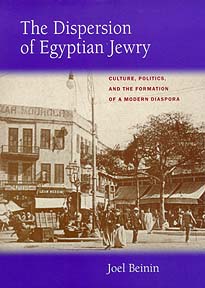 | Title: The dispersion of Egyptian Jewry: culture, politics, and the formation of a modern diaspora Author: Beinin, Joel 1948- Published: University of California Press, 1998 Subjects: History | Middle Eastern History | Religion | Judaism | Middle Eastern Studies | Jewish Studies Publisher's Description: In this provocative and wide-ranging history, Joel Beinin examines fundamental questions of ethnic identity by focusing on the Egyptian Jewish community since 1948. A complex and heterogeneous people, Egyptian Jews have become even more diverse as their diaspora continues to the present day. Central to Beinin's study is the question of how people handle multiple identities and loyalties that are dislocated and reformed by turbulent political and cultural processes. It is a question he grapples with himself, and his reflections on his experiences as an American Jew in Israel and Egypt offer a candid, personal perspective on the hazards of marginal identities. [brief] Similar Items |
| 114. | 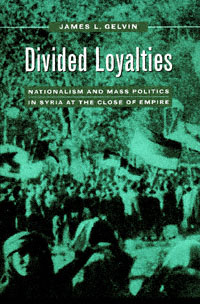 | Title: Divided loyalties: nationalism and mass politics in Syria at the close of Empire Author: Gelvin, James L 1951- Published: University of California Press, 1999 Subjects: History | Middle Eastern Studies | Middle Eastern History | Politics Publisher's Description: James L. Gelvin brings a new and distinctive perspective to the perennially fascinating topic of nationalism in the Arab Middle East. Unlike previous historians who have focused on the activities and ideas of a small group of elites, Gelvin details the role played by non-elites in nationalist politics during the early part of the twentieth century. Drawing from previously untapped sources, he documents the appearance of a new form of political organization - the popular committee - that sprang up in cities and villages throughout greater Syria in the immediate aftermath of the First World War. These committees empowered a new type of nationalist leadership, made nationalist politics a mass phenomenon for the first time, and articulated a view of nation and nationalism that continues to inform the politics of the region today.Gelvin does more than recount an episode in the history of nationalism in the Arab Middle East. His examination of leaflets, graffiti, speeches, rumors, and editorials offers fresh insights into the symbolic construction of national communities. His analysis of ceremonies - national celebrations, demonstrations, theater - contributes to our understanding of the emergence of mass politics. By situating his study within a broader historical context, Gelvin has written a book that will be of interest to all who wish to understand nationalism in the region and beyond. [brief] Similar Items |
| 115. | 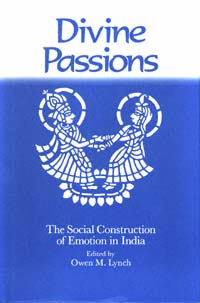 | Title: Divine passions: the social construction of emotion in India Author: Lynch, Owen M 1931- Published: University of California Press, 1990 Subjects: Anthropology | South Asia | History Publisher's Description: Naked holy men denying sexuality and feeling; elderly people basking in the warmth and security provided by devoted and attentive family members; fastidious priests concerned solely with rules of purity and minutiae of ritual practice; puritanical moralists concealing women and sexuality behind purdah's veils - these are familiar Western stereotypes of India. The essays in Divine Passions , however, paint other, more colorful and emotionally alive pictures of India: ecstatic religious devotees rolling in temple dust; gray-haired elders worrying about neglect and mistreatment by family members; priests pursuing a lusty, carefree ideal of the good life; and jokers reviling one another with bawdy, sexual insults at marriages.Drawing on rich ethnographic data from emotion-charged scenarios, these essays question Western academic theories of emotion, particularly those that reduce emotions to physiological sensations or to an individual's private feelings. Presenting an alternative view of emotions as culturally constructed and morally evaluative concepts grounded in the bodily self, the contributors to Divine Passions help dispel some of the West's persistent misconceptions of Indian emotional experience. Moreover, the edition as a whole argues for a new and different understanding of India based on field research and an understanding of the devotional (bhakti) tradition. [brief] Similar Items |
| 116. |  | Title: Dr. Strangelove's America: society and culture in the atomic age Author: Henriksen, Margot A Published: University of California Press, 1997 Subjects: History | United States History | Cultural Anthropology | Sociology Publisher's Description: Did America really learn to "stop worrying and love the bomb," as the title of Stanley Kubrick's 1964 film, Dr. Strangelove , would have us believe? Does that darkly satirical comedy have anything in common with Martin Luther King Jr.'s impassioned "I Have a Dream" speech or with Elvis Presley's throbbing "I'm All Shook Up"? In Margot Henriksen's vivid depiction of the decades after World War II, all three are expressions of a cultural revolution directly related to the atomic bomb. Although many scientists and other Americans protested the pursuit of nuclear superiority after World War II ended, they were drowned out by Cold War rhetoric that encouraged a "culture of consensus." Nonetheless, Henriksen says, a "culture of dissent" arose, and she traces this rebellion through all forms of popular culture.At first, artists expressed their anger, anxiety, and despair in familiar terms that addressed nuclear reality only indirectly. But Henriksen focuses primarily on new modes of expression that emerged, discussing the disturbing themes of film noir (with extended attention to Alfred Hitchcock) and science fiction films, Beat poetry, rock 'n' roll, and Pop Art. Black humor became a primary weapon in the cultural revolution while literature, movies, and music gave free rein to every possible expression of the generation gap. Cultural upheavals from "flower power" to the civil rights movement accentuated the failure of old values.Filled with fascinating examples of cultural responses to the Atomic Age, Henriksen's book is a must-read for anyone interested in the United States at mid-twentieth century. [brief] Similar Items |
| 117. | 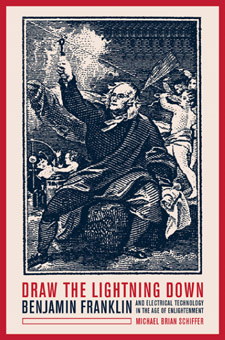 | Title: Draw the lightning down: Benjamin Franklin and electrical technology in the Age of Enlightenment Author: Schiffer, Michael B Published: University of California Press, 2003 Subjects: History | Urban Studies | History of Science | Anthropology | American Studies | European History Publisher's Description: Most of us know - at least we've heard - that Benjamin Franklin conducted some kind of electrical experiment with a kite. What few of us realize - and what this book makes powerfully clear - is that Franklin played a major role in laying the foundations of modern electrical science and technology. This fast-paced book, rich with historical details and anecdotes, brings to life Franklin, the large international network of scientists and inventors in which he played a key role, and their amazing inventions. We learn what these early electrical devices - from lights and motors to musical and medical instruments - looked like, how they worked, and what their utilitarian and symbolic meanings were for those who invented and used them. Against the fascinating panorama of life in the eighteenth century, Michael Brian Schiffer tells the story of the very beginnings of our modern electrical world. The earliest electrical technologies were conceived in the laboratory apparatus of physicists; because of their surprising and diverse effects, however, these technologies rapidly made their way into many other communities and activities. Schiffer conducts us from community to community, showing how these technologies worked as they were put to use in public lectures, revolutionary experiments in chemistry and biology, and medical therapy. This story brings to light the arcane and long-forgotten inventions that made way for many modern technologies - including lightning rods (Franklin's invention), cardiac stimulation, xerography, and the internal combustion engine - and richly conveys the complex relationships among science, technology, and culture. [brief] Similar Items |
| 118. |  | Title: Dreams of difference: the Japan romantic school and the crisis of modernity Author: Doak, Kevin Michael Published: University of California Press, 1994 Subjects: History | Asian History | Japan | Literary Theory and Criticism Publisher's Description: From 1935 to 1945, the Japan Romantic School (Nihon Romanha), a group of major intellectuals and literary figures, explored issues concerning politics, literature, and nationalism in ways that still influence cultural discourse in Japan today. Kevin Doak's timely study is a broad critique of modernity in early twentieth-century Japan. He uses close readings and translations of texts and poems to suggest that the school's interest in romanticism stemmed from its attempt to surmount the "cultural crisis" of lost traditions. This attempt to overcome modernity eventually reduced the movement's earlier critical impulses to expressions of nationalist longing. [brief] Similar Items |
| 119. | 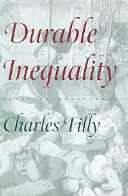 | Title: Durable inequality Author: Tilly, Charles Published: University of California Press, 1998 Subjects: Sociology | History | Politics | Economics and Business Publisher's Description: Charles Tilly, in this eloquent manifesto, presents a powerful new approach to the study of persistent social inequality. How, he asks, do long-lasting, systematic inequalities in life chances arise, and how do they come to distinguish members of different socially defined categories of persons? Exploring representative paired and unequal categories, such as male/female, black/white, and citizen/noncitizen, Tilly argues that the basic causes of these and similar inequalities greatly resemble one another. In contrast to contemporary analyses that explain inequality case by case, this account is one of process. Categorical distinctions arise, Tilly says, because they offer a solution to pressing organizational problems. Whatever the "organization" is - as small as a household or as large as a government - the resulting relationship of inequality persists because parties on both sides of the categorical divide come to depend on that solution, despite its drawbacks. Tilly illustrates the social mechanisms that create and maintain paired and unequal categories with a rich variety of cases, mapping out fertile territories for future relational study of durable inequality. [brief] Similar Items |
| 120. | 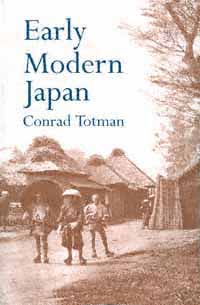 | Title: Early modern Japan Author: Totman, Conrad D Published: University of California Press, 1993 Subjects: History | Asian Studies | Asian History | Japan Publisher's Description: This thoughtfully organized survey of Japan's early modern period (1568-1868) is a remarkable blend of political, economic, intellectual, literary, and cultural history. The only truly comprehensive study in English of the Tokugawa period, it also introduces a new ecological perspective, covering na . . . [more] Similar Items |